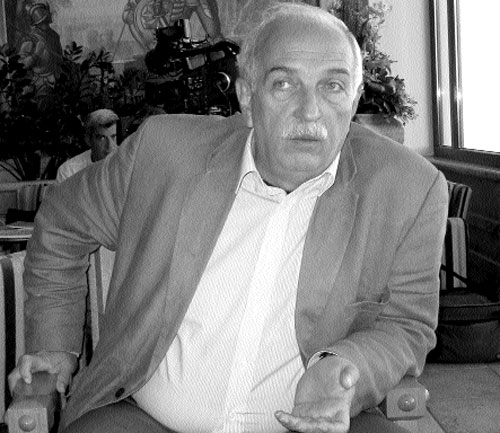Leader of Youth Social Democratic party of Georgia representing “Georgian Dream” alliance Gia Giorgoliani believes that joining the Customs Union Armenia does not reject European integration.
– In your opinion, how will the Armenian-Georgian relations develop, after the statement of the President of Armenian in Moscow on September 3, referring to the fact that Georgia is striving for Europe, and Armenia gave its preference to the so-called Russian direction?
– I do not think that it was a tragic statement. The idea of the Eurasian Union is just starting to work. I do not consider it a closed structure, such as the European Union. My impression is that the idea of a Eurasian Union is an idea of a cooperation in a big territory, where the economic integration is going to be a dominant. Within the framework of the Customs Union, in my opinion, the economic cooperation is dominant. As for the EU, it’s a structure based first of all on neighborhood and common culture. Therefore, I cannot imagine the very close cooperation of the countries of our region with this structure. Some countries may have a close cooperation with the European Union, even possibly be members of this structure, but many of them are not capable, and the European Union itself is unable to be integrated with those countries. Accordingly, there is a need for other integration processes. Nowadays, isolated economies can not develop. I think that the statement of the President of Armenia and the steps towards it are first of all directed to the regional economic integration, because such small countries like Armenia and Georgia can not be isolated and develop economy.
The integration processes are imperative. And, there is no need to be a great economist to understand that it is better to do with the neighbors.
Georgia, so to speak, has a direct connection with the European Union by the sea, but in addition to economic trends, and the European Union is interesting to Georgia in the cultural context. I think that both Armenia and Georgia have culturally commonalities with the European Union, but I do not think that Armenia’s intension with regard to close cooperation with the Customs Union refuses to cooperate with Europe and chooses other destination. Within the European Union, it is also assumed to have economical, and then cultural cooperation. I do not think that general cultural values within the European Union can bring a close spiritual cooperation. I, myself, for example, do not imagine that, for instances, how Armenia, Turkey, Azerbaijan, Georgia and Kazakhstan will have a close spiritual partnership within the European Union. So, in my opinion, Armenia’s President’s statement should be perceived as following that Armenia is ready for regional, particularly active economic partnerships with neighboring countries, first and foremost with Russia. Not to speak about that Armenia and RF are partners in a number of directions. But, I do not think that it is a denial to the direction of European development.
– You emphasize that the Customs Union and the Eurasian Union are principally economic cooperation platforms, but there are political issues. For example, Nagorno-Karabakh problem, Abkhazian conflict, whose economic aspect is directly proportional to the political aspect. For the development of cooperation within the Customs Union, it is talked about the possibility of reopening of Abkhaz railway, but it assumes a political decision. What do you think about it?
– I do not think that we should wait for radical political decisions on these issues. I do not think that there will urgent changes. With regard to Nagorno-Karabakh, I can not say anything definite, but with regard to Abkhazia, we can gradually overcome the rapid reaction. I believe that in the near future, in 5-10 years, we should exclude the discussions about the political status from the agenda and begin active cooperation in economic and humanitarian sectors. In this context, I think the issue of the railway, which is quite an important issue, can be brought to life. This is not a bad idea, in my opinion, but for bringing it to life it is probably necessary to clarify mostly Russian-Georgian relations. These relations yet begin to get a new format. The cooperation between Georgia and Russia is quite complicated since Georgians will constantly think that there is a separation approach from Russia. As far as I understand, in the nearest future, RF will not give up recognition of Abkhazia, we will not give up non-recognition of the policy. The history, of course, will not be repeated, but we need to take some examples as a note, let’s say, the example of Eastern and Western Germany. West Germany did not recognize East Germany, but there was an economic cooperation with the Soviet Union. This is an example, which shows that we must be guided by pragmatic interests. I think we can do steps in this direction that were considered unrealistic under the Saakashvili’s ruling.
– Recently, Georgian President Mikhail Saakashvili made an eccentric speech, this time from the UN tribune, which was not definitely perceived. How would you comment on that speech?
– From October 27, Saakashvili will not have a place in the political arena of Georgia and will not participate in political processes. His statements are not the position of the Government of Georgia. Yes, Georgia has entangled relations with Russia, but the policy of escalation, tension of relations is in the past. Since October 1 of last year, this policy passed into history. We have no alternative to peaceful development and pragmatic cooperation. So, it was Saakashvili’s “swan song”. I will not comment on it, especially since there is not much to comment on, it was a repetition of the past.
Continuation in tomorrow’s issue.
Interviewer Nelly GRIGORYAN



















































